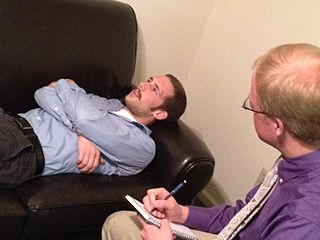
Cognitive behavioral therapy (CBT) is a form of psychotherapy that aims to reduce symptoms of various mental health conditions, primarily depression, PTSD and anxiety disorders. Cognitive behavioral therapy focuses on challenging and changing cognitive distortions and their associated behaviors to improve emotional regulation and develop personal coping strategies that target solving current problems. Though it was originally designed to treat depression, its uses have been expanded to include many issues and the treatment of many mental health and other conditions, including anxiety, substance use disorders, marital problems, ADHD, and eating disorders. CBT includes a number of cognitive or behavioral psychotherapies that treat defined psychopathologies using evidence-based techniques and strategies.
In psychology, a mood is an affective state. In contrast to emotions or feelings, moods are less specific, less intense and less likely to be provoked or instantiated by a particular stimulus or event. Moods are typically described as having either a positive or negative valence. In other words, people usually talk about being in a good mood or a bad mood. There are many different factors that influence mood, and these can lead to positive or negative effects on mood.

Mental health encompasses emotional, psychological, and social well-being, influencing cognition, perception, and behavior. According to the World Health Organization (WHO), it is a "state of well-being in which the individual realizes his or her abilities, can cope with the normal stresses of life, can work productively and fruitfully, and can contribute to his or her community". It likewise determines how an individual handles stress, interpersonal relationships, and decision-making. Mental health includes subjective well-being, perceived self-efficacy, autonomy, competence, intergenerational dependence, and self-actualization of one's intellectual and emotional potential, among others.
eHealth describes healthcare services which are supported by digital processes, communication or technology such as electronic prescribing, Telehealth, or Electronic Health Records (EHRs). The use of electronic processes in healthcare dated back to at least the 1990s. Usage of the term varies as it covers not just "Internet medicine" as it was conceived during that time, but also "virtually everything related to computers and medicine". A study in 2005 found 51 unique definitions. Some argue that it is interchangeable with health informatics with a broad definition covering electronic/digital processes in health while others use it in the narrower sense of healthcare practice using the Internet. It can also include health applications and links on mobile phones, referred to as mHealth or m-Health. Key components of eHealth include electronic health records (EHRs), telemedicine, health information exchange, mobile health applications, wearable devices, and online health information. These technologies enable healthcare providers, patients, and other stakeholders to access, manage, and exchange health information more effectively, leading to improved communication, decision-making, and overall healthcare outcomes.
Mental disorders are classified as a psychological condition marked primarily by sufficient disorganization of personality, mind, and emotions to seriously impair the normal psychological and often social functioning of the individual. Individuals diagnosed with certain mental disorders can be unable to function normally in society. Mental disorders may consist of several affective, behavioral, cognitive and perceptual components. The acknowledgement and understanding of mental health conditions has changed over time and across cultures. There are still variations in the definition, classification, and treatment of mental disorders.
Self-diagnosis is the process of diagnosing, or identifying, medical conditions in oneself. It may be assisted by medical dictionaries, books, resources on the Internet, past personal experiences, or recognizing symptoms or medical signs of a condition that a family member previously had or currently has.

In applied psychology, interventions are actions performed to bring about change in people. A wide range of intervention strategies exist and they are directed towards various types of issues. Most generally, it means any activities used to modify behavior, emotional state, or feelings. Psychological interventions have many different applications and the most common use is for the treatment of mental disorders, most commonly using psychotherapy. The ultimate goal behind these interventions is not only to alleviate symptoms but also to target the root cause of mental disorders.
Behavioral activation (BA) is a third-generation behavior therapy for treating mood disorders. Behavioral activation primarily emphasizes engaging in positive and enjoyable activities to enhance one's mood.

Major depressive disorder, often simply referred to as depression, is a mental disorder characterized by prolonged unhappiness or irritability. It is accompanied by a constellation of somatic and cognitive signs and symptoms such as fatigue, apathy, sleep problems, loss of appetite, loss of engagement, low self-regard/worthlessness, difficulty concentrating or indecisiveness, or recurrent thoughts of death or suicide.
Behavioral health outcome management (BHOM) involves the use of behavioral health outcome measurement data to help guide and inform the treatment of each individual patient. Like blood pressure, cholesterol and other routine lab work that helps to guide and inform general medical practice, the use of routine measurement in behavioral health is proving to be invaluable in assisting therapists to deliver better quality care.
The My Mood Monitor Screen is a quick, validated, self-rated, multi-dimensional mental health symptom checklist that screens for and monitors changes in potential mood and anxiety symptoms.
Cyclothymia, also known as cyclothymic disorder, psychothemia / psychothymia, bipolar III, affective personality disorder and cyclothymic personality disorder, is a mental and behavioural disorder that involves numerous periods of symptoms of depression and periods of symptoms of elevated mood. These symptoms, however, are not sufficient to indicate a major depressive episode or a manic episode. Symptoms must last for more than one year in children and two years in adults.
The Bipolar Spectrum Diagnostic Scale (BSDS) is a psychiatric self-rating scale created by Ronald Pies in screening for bipolar disorder (BD). Its initial version consists of a descriptive narrative aimed to capture the nuances and milder variants of BD. Upon revision by Nassir Ghaemi and colleagues, the scale was developed into two sections for a total of 20 questions. The BSDS is widely accepted as an important measure of bipolar disorder alongside other diagnostic tools such as the Mood Disorder Questionnaire and the Bipolar Depression Rating Scale.
Experts from many different fields have conducted research and held debates about how using social media affects mental health. Research suggests that mental health issues arising from social media use affect women more than men and vary according to the particular social media platform used, although it does affect every age and gender demographic in different ways. Psychological or behavioural dependence on social media platforms can result in significant negative functions in individuals' daily lives. Studies show there are several negative effects that social media can have on individuals' mental health and overall well-being. While researchers have attempted to examine why and how social media is problematic, they still struggle to develop evidence-based recommendations on how they would go about offering potential solutions to this issue. Because social media is constantly evolving, researchers also struggle with whether the disorder of problematic social media use would be considered a separate clinical entity or a manifestation of underlying psychiatric disorders. These disorders can be diagnosed when an individual engages in online content/conversations rather than pursuing other interests.
Mental illnesses, also known as psychiatric disorders, are often inaccurately portrayed in the media. Films, television programs, books, magazines, and news programs often stereotype the mentally ill as being violent, unpredictable, or dangerous, unlike the great majority of those who experience mental illness. As media is often the primary way people are exposed to mental illnesses, when portrayals are inaccurate, they further perpetuate stereotypes, stigma, and discriminatory behavior. When the public stigmatizes the mentally ill, people with mental illnesses become less likely to seek treatment or support for fear of being judged or rejected by the public. However, with proper support, not only are most of those with psychiatric disorders able to function adequately in society, but many are able to work successfully and make substantial contributions to society.
Compassion Focused Therapy (CFT) is a system of psychotherapy developed by Professor Paul Gilbert (OBE) that integrates techniques from cognitive behavioral therapy with concepts from evolutionary psychology, social psychology, developmental psychology, Buddhist psychology, and neuroscience. According to Gilbert, "One of its key concerns is to use compassionate mind training to help people develop and work with experiences of inner warmth, safeness and soothing, via compassion and self-compassion."
The Mood Disorder Questionnaire (MDQ) is a self-report questionnaire designed to help detect bipolar disorder. It focuses on symptoms of hypomania and mania, which are the mood states that separate bipolar disorders from other types of depression and mood disorder. It has 5 main questions, and the first question has 13 parts, for a total of 17 questions. The MDQ was originally tested with adults, but it also has been studied in adolescents ages 11 years and above. It takes approximately 5–10 minutes to complete. In 2006, a parent-report version was created to allow for assessment of bipolar symptoms in children or adolescents from a caregiver perspective, with the research looking at youths as young as 5 years old. The MDQ has become one of the most widely studied and used questionnaires for bipolar disorder, and it has been translated into more than a dozen languages.
Paternal depression is a psychological disorder derived from parental depression. Paternal depression affects the mood of men; fathers and caregivers in particular. 'Father' may refer to the biological father, foster parent, social parent, step-parent or simply the carer of the child. This mood disorder exhibits symptoms similar to postpartum depression (PPD) including anxiety, insomnia, irritability, consistent breakdown and crying episodes, and low energy. This may negatively impact family relationships and the upbringing of children. Parents diagnosed with parental depression often experience increased stress and anxiety levels during early pregnancy, labor and postpartum. Those with parental depression may have developed it early on but some are diagnosed later on from when the child is a toddler up until a young adult.

Internet-based treatments for trauma survivors is a growing class of online treatments that allow for an individual who has experienced trauma to seek and receive treatment without needing to attend psychotherapy in person. The progressive movement to online resources and the need for more accessible mental health services has given rise to the creation of online-based interventions aimed to help those who have experienced traumatic events. Cognitive behavioral therapy (CBT) has shown to be particularly effective in the treatment of trauma-related disorders and adapting CBT to an online format has been shown to be as effective as in-person CBT in the treatment of trauma. Due to its positive outcomes, CBT-based internet treatment options for trauma survivors has been an expanding field in both research and clinical settings.
Artificial intelligence in mental health is the application of artificial intelligence (AI), computational technologies and algorithms to supplement the understanding, diagnosis, and treatment of mental health disorders. AI is becoming a ubiquitous force in everyday life which can be seen through frequent operation of models like ChatGPT. Utilizing AI in the realm of mental health signifies a form of digital healthcare, in which, the goal is to increase accessibility in a world where mental health is becoming a growing concern. Prospective ideas involving AI in mental health include identification and diagnosis of mental disorders, explication of electronic health records, creation of personalized treatment plans, and predictive analytics for suicide prevention. Learning how to apply AI in healthcare proves to be a difficult task with many challenges, thus it remains rarely used as efforts to bridge gaps are deliberated.




